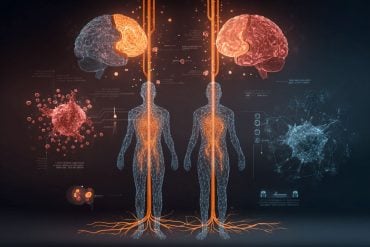Summary: A new Scientific Reports study reveals alcohol may have a surprising effect on learning and memory. Researchers found those who drank alcohol following a learned word task had better recollection of the terms they learned the next day than those who did not drink.
Source: University of Exeter.
Drinking alcohol improves memory for information learned before the drinking episode began, new research suggests.
In the University of Exeter study, 88 social drinkers were given a word-learning task. Participants were then split in two groups at random and told either to drink as much as they liked (the average was four units) or not to drink at all.
The next day, they all did the same task again — and those who had drunk alcohol remembered more of what they had learned.
The researchers are keen to stress that this limited positive effect should be considered alongside the well-established negative effects of excessive alcohol on memory and mental and physical health.
“Our research not only showed that those who drank alcohol did better when repeating the word-learning task, but that this effect was stronger among those who drank more,” said Professor Celia Morgan, of the University of Exeter.
“The causes of this effect are not fully understood, but the leading explanation is that alcohol blocks the learning of new information and therefore the brain has more resources available to lay down other recently learned information into long-term memory.

“The theory is that the hippocampus — the brain area really important in memory — switches to ‘consolidating’ memories, transferring from short into longer-term memory.”
The effect noted by the researchers has been shown under laboratory conditions before, but this is the first study to test it in a natural setting, with people drinking in their homes.
There was also a second task which involved looking at images on a screen.
This task was completed once after the drinkers had drunk alcohol and again the following day, and the results did not reveal significant differences in memory performance post-drinking.
The study’s participants were 31 males and 57 females, aged 18-53.
Source: Alex Morrison – University of Exeter
Image Source: NeuroscienceNews.com image is in the public domain.
Original Research: Full open access research for “Improved memory for information learnt before alcohol use in social drinkers tested in a naturalistic setting” by Molly Carlyle, Nicolas Dumay, Karen Roberts, Amy McAndrew, Tobias Stevens, Will Lawn & Celia J. A. Morgan in Scientific Reports. Published online July 242017 doi:10.1038/s41598-017-06305-w
[cbtabs][cbtab title=”MLA”]University of Exeter “Alcohol Boosts Recall of Earlier Learning.” NeuroscienceNews. NeuroscienceNews, 24 July 2017.
<https://neurosciencenews.com/earlier-learning-alcohol-7157/>.[/cbtab][cbtab title=”APA”]University of Exeter (2017, July 24). Alcohol Boosts Recall of Earlier Learning. NeuroscienceNew. Retrieved July 24, 2017 from https://neurosciencenews.com/earlier-learning-alcohol-7157/[/cbtab][cbtab title=”Chicago”]University of Exeter “Alcohol Boosts Recall of Earlier Learning.” https://neurosciencenews.com/earlier-learning-alcohol-7157/ (accessed July 24, 2017).[/cbtab][/cbtabs]
Abstract
Improved memory for information learnt before alcohol use in social drinkers tested in a naturalistic setting
Alcohol is known to facilitate memory if given after learning information in the laboratory; we aimed to investigate whether this effect can be found when alcohol is consumed in a naturalistic setting. Eighty-eight social drinkers were randomly allocated to either an alcohol self-dosing or a sober condition. The study assessed both retrograde facilitation and alcohol induced memory impairment using two independent tasks. In the retrograde task, participants learnt information in their own homes, and then consumed alcohol ad libitum. Participants then undertook an anterograde memory task of alcohol impairment when intoxicated. Both memory tasks were completed again the following day. Mean amount of alcohol consumed was 82.59 grams over the evening. For the retrograde task, as predicted, both conditions exhibited similar performance on the memory task immediately following learning (before intoxication) yet performance was better when tested the morning after encoding in the alcohol condition only. The anterograde task did not reveal significant differences in memory performance post-drinking. Units of alcohol drunk were positively correlated with the amount of retrograde facilitation the following morning. These findings demonstrate the retrograde facilitation effect in a naturalistic setting, and found it to be related to the self-administered grams of alcohol.
“Improved memory for information learnt before alcohol use in social drinkers tested in a naturalistic setting” by Molly Carlyle, Nicolas Dumay, Karen Roberts, Amy McAndrew, Tobias Stevens, Will Lawn & Celia J. A. Morgan in Scientific Reports. Published online July 242017 doi:10.1038/s41598-017-06305-w






